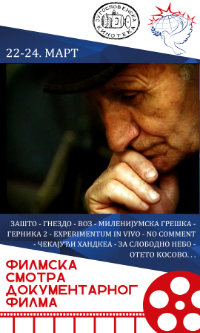NATO’S SHAMFUL LEGACY
| Activities - Comments |
Inerview with Zivadin Jovanovic, Federal Minister of Foreign Affairs of FR of Yugoslavia (1998-2000), President of the Belgrade Forum for a World of Equals, President of Silk Road Connectivity Research Center, Serbia
Maurizio Vezzosi
Q. Remembering the 1999's bombing over Belgrad, some days ago Serbian president Vucic stressed that Serbia isn't going to join NATO. How do you comment it? R. Firstly, about 80% of Serbia’s population is strongly against membership to NATO. It is hardly to imagine that any democratic government could ignore that fact. Secondly, Serbia as the peace loving country, never belonged to any military block, never sought other countries’ territories or resources and can’t see justification to be the member. Thirdly, NATO is responsible for illegal aggression on Serbia and Montenegro 1999, for the death of thousands of innocent people in Serbia, including children, for the use of depleted uranium ammunition and other means of massive destruction. It is also responsible for the war damage valued at about 100 billion USD. Subsequently, joining NATO would be tantamount to humiliating the victims and to amnesty of those responsible for the crimes against peace and humanity. Finally, NATO pursues the strategy of expansion to the East and is stepping up confrontation with Russia while Serbia believes in elimination of confrontation and in the need of partnership and cooperation between neighborly Russia and EU. So, I am convinced that active neutrality, openness, balanced foreign policy and win win cooperation is the best option for Serbia, particularly now in the era of profound global changes.
R. Firstly, about 80% of Serbia’s population is strongly against membership to NATO. It is hardly to imagine that any democratic government could ignore that fact. Secondly, Serbia as the peace loving country, never belonged to any military block, never sought other countries’ territories or resources and can’t see justification to be the member. Thirdly, NATO is responsible for illegal aggression on Serbia and Montenegro 1999, for the death of thousands of innocent people in Serbia, including children, for the use of depleted uranium ammunition and other means of massive destruction. It is also responsible for the war damage valued at about 100 billion USD. Subsequently, joining NATO would be tantamount to humiliating the victims and to amnesty of those responsible for the crimes against peace and humanity. Finally, NATO pursues the strategy of expansion to the East and is stepping up confrontation with Russia while Serbia believes in elimination of confrontation and in the need of partnership and cooperation between neighborly Russia and EU. So, I am convinced that active neutrality, openness, balanced foreign policy and win win cooperation is the best option for Serbia, particularly now in the era of profound global changes.
Q. How do you describe the legacy of Atlantic Alliance's bombing over former-Yugoslavia?
R. It is shameful legacy of illegality, manipulations, destruction and killing innocent people. From defensive NATO became aggressive alliance, braking UN Charter, Helsinki Final Document, Founding Act (1949), member countries’ national constitutions, the role of UN SC. But it is also shameful for member countries which participated in the 1999 illegal aggression. This profound stein on their faces could be removed only by reevaluating immoral and disastrous Clinton/Albright/Blair policy which led to the criminal aggression. NATO aggression was not a “little Kosovo war” but a turning point in the global relations, it was decisive step towards destruction of the World Order established on the outcome of the Second WW.
What has followed after were - more wars, millions of killed, wounded and refugees, more military bases, frightening global and national divisions, mistrust, confrontations, spreading of terrorism and separatism – uncertain future of the civilization. Is this what we have expected and hoped for after the fall of the Berlin Wall?
Twenty years after the most, if not the whole of the Balkan, is composed of many puppet states servicing NATO and western multinational corporations. The nations are more divided, the region underdeveloped and full of tensions. What use to be state or socially owned commerce, industry, banks, food production, services – in the course of criminal privatization became property of the western multinational corporations and few national tycoons. From the year 2000. about 40 billion of USD have been sucked from Serbia only by the western banks. Hundreds of thousands of refugees and displaced persons still live in misery in central Serbia without chances for free and safe return to their homes in Croatia, Bosnia and Kosovo and Metohija. This is the real face of the western democracy and humanism.
Q. What is the perspective for Kosovo and Metohija's problem?
R. Perspectives for the balanced, just and sustainable solution will be real only if the West recognizes own mistakes such as decades long support, financing, training and arming separatist and terrorist groups in Kosovo and Metohija. Who can claim, for instance, that Germany’s two decades long hospitality and support to the “Kosovo Government in exile” of Buiar Bukoshi (1980-2000) was the policy of legally based relations, peace and stability!? Or, could there be proclamation of illegal secession in 2008, if there wasn’t 1999 NATO aggression, in alliance with the terrorist KLA and subsequent occupation of this Serbia’s province?
To secure peaceful and lasting solution it is necessary to respect the basic principles of the international law, UN Charter, Helsinki Final Document and UN SC resolution 1244 (1999). This decision approved by all permanent UN SC members (USA, Russia, China, GB, France) guaranties wide autonomy for the Province within sovereignty and territorial integrity of Yugoslavia, i.e. Serbia. It authorizes also return to the Province of agreed contingents of Serbia’s military and police, free and safe return of all refugees and displaced persons, including about 250.000 of Serbs and other non-Albanians to their homes. None of these provisions have been complied with, as yet.
The problem is that the western powers (NATO) have been trying to impose a “deal” according to which Serbia would recognize illegal unilateral secession and membership of Kosovo to the United Nations, now, in exchange for the promises to become EU member sometime in the future. This is shortsighted, mercantilist reasoning disregarding any principles, laws or UN SC decisions. Put aside misreading of the global trends and changes. What the leading western powers are interested in is “solution” tailored to please their geopolitical interests - expansion toward East and confrontation with Russia and China.
Germany and France, expect also that Serbia pays for a return of the EU unity on Kosovo. The reasoning behind is that once they persuade Serbia to sign “comprehensive legally binding document” then illegal and unilateral secession would become virtually legal. Subsequently the five EU member states presently opposing recognition (Spain, Slovakia, Rumania, Greece and Cyprus) would be relieved of the fear of the precedent. Of course, those hopes are in vain. Not only that Serbia will not enter dishonest “deal”, but I should like to see Serbia’s diplomacy working hard to further expand the number of EU member countries which would withdraw their hastily recognitions undertaken on Washington’s “advice”, contrary to the international law, peace and stability in Europe.
Q. What is your opinion on the Brussels negotiations on Kosovo under EU umbrella?
The Brussels format of negotiations on Kosovo and Metohija is inappropriate formula without chances to deliver balanced and sustainable solution. It is so because the Brussels process includes only countries and integrations which continuously supported secession and terrorism in Kosovo and Metohija, even by military aggression, and excludes all countries and organizations including UN, which support sovereignty and integrity of Serbia as well as compliance with the norms of international law.
Russia and China which participated actively in ending NATO aggression and in adopting UN SC resolution 1244 in 1999 cannot be excluded from its implementation. Is there anybody believing that they are less relevant international factors 2019 than in 1999?
As for “Kosovo precedent”, it has been already working. Catalonia is just the most visible proof. The others are “in the pipe” awaiting their turn. Even blackmailed Serbia couldn’t stop this!
Q. With a new name – north – Macedonia is joining the Atlantic Alliance. Which effects this fact is going to produce over the Balkan area?
R. Everybody should be free to choose own options – alliances or neutrality. Having regard to separatist tendency and ideas for creation of Greater Albania, I suppose, the Government in Skopje is hoping that formal membership in NATO will guarantee sovereignty and territorial integrity of the country. There is also expectation that this may help in getting sooner EU membership.
Serbia maintains the policy of openness, good neighborliness and mutually beneficial cooperation with the North Macedonia. Overall relations are traditionally good, supported from both sides and I believe that this will continue after the country formally becomes NATO member. Newly elected president Stevo Pendarovski and Serbian president Aleksandar Vucic have just exchanged messages expressing their support for further strengthening of good neighborly relations.
Q. How doctrines and groups close to radical Islam influence the region's equilibrium?
R. The Muslim radicalism in the Balkans is a part of the heritage of the civil war in Bosnia and Hercegovina (1992-5). In that period some western power centers which supported Muslim side had organized, armed and brought from the Middle East, Chechnya, Afghanistan, Pakistan, North Africa and other places, thousands of mujahidin to strengthen forces of Alija Izetbegovic. Many of them not only remained in the region afterwards but have been actively engaged in spreading extremist indoctrination and zones of sherya law, up to present days. Thus places like Gornja Maoca, Stijena and some others in Bosnia and Herzegovina are controlled by wahhabists. Extremism financed from outside, is growing. Kosovo and Metohija and Bosnia and Herzegovina are the places of recruitment of hundreds of ISIS mujahidin.
Q. As Kosovo, Bosnia-Herzegovina shows itself as one of the most problematic point of whole Balkan area. What's about the perspectives that regard it? Does the possibility of a new conflict exist?
R. Perspectives of the peace and stability in the Balkans are closely related to the processes Europe and global changes. Europe is divided on many lines and caught in confrontation. Terrorism is continuously affecting everyday life. There are more foreign military bases and armament in Europe now then at the time of cold war confrontation. Geopolitical games and the struggle for spheres of influence are being intensified not only on the global level but within western alliances, too. All this is negatively affecting the Balkans still far from recovery of the recent conflicts. Naturally, that growing tensions, extremisms, revival of neo-fascism, revision of history, double standard policy cause uncertainty and fear of new conflicts.
In such conditions, Albanian separatism and concept of Greater Albania supported from certain power centers are the main source of instability and uncertainty in the Balkans. The other source is enlargement of the Muslim extremism particularly in Bosnia and Herzegovina but also in other Balkan countries and regions including in the Province of Kosovo and Metohija. According to the mass media reports, a lot of money from certain Gulf countries is being invested in the spreading and strengthening of vahhabi movement. The problem of massive migration from the Middle East and North Africa is also being exploited for the growth of extremism. In Bosnia and Herzegovina the basic problem is to revise the Dayton Peace Agreement (1995) guaranteeing constitutional order based on the equality of the two entities – Republic of Srpska and Federation of B&H, i.e. three constituent peoples – Serbs, Bosniaks (Muslims) and Croats. There is quite clear intention of the western power centers to establish unitary state dominated by the Bosniaks in spite of the fact that the Alija Izetbegovic’s attempt to impose Bosniaks domination was the cause of the bloody civil war 1992-1995.
To be able to approach the Balkans in a normal, objective and balanced way, to be able to act efficiently and constructively Europe needs to undergo open and profound re-examination of own policy in the whole period from the fall of the Berlin Wall up to present days, including involvement in so called Yugoslav crisis (1991-95), NATO aggression on Yugoslavia (1999) and hasty recognition of Kosovo in 2008.
Q. How Russia and China actually influence the Balkans?
R. Serbia has long tradition of close and friendly relations with both Russia and China. Profound mutual respect and trust led to signing formal documents on strategic relations with them. Not only that those two global powers, permanent members of UN SC never in history waged war against Serbia, but always have supported and helped her whenever she was threatened, attacked, isolated or under sanctions. Such a rare positive heritage, devotion to peace and openness plays very important role in expanding and strengthening comprehensive win win cooperation.
Russia and China respect Serbia as an important partner from this part of Europe, they never meddle in internal affairs nor do they advance any political conditionality to our cooperation. It is of paramount importance that Russia and China support Serbia in preserving her sovereignty and territorial integrity while the western partners exert enormous pressure on Serbia to recognize illegal secession of the Province of Kosovo and Metohija, secession which would have never be proclaimed if it were not for 1999 NATO aggression and subsequent occupation.
Concerning economic cooperation, Russia is the principal and steady Serbian partner in energy sector (gas, oil, hydro), in modernization of infrastructure and nuclear energy implementation for peaceful purposes. Russia is very important importer of fruits and food products in general, from Serbia.. Cooperation of defense sectors is being also improved. Customs and visas have been abolished. Serbia is not participating in USA/EU sanctions against Russia which are unjust and counterproductive.
Serbia’s economic cooperation with China is growing in the most dynamic way comprising industry (steel, cupper, tiers), infrastructure (high speed railway Belgrade-Budapest), energy (Kostolac), mining (Majdanpek, Bor), finance, tourism, high-tech. Serbia is among the first countries which joined the global Belt and Road Initiative launched by the President Xi Jinping in 2013 and among the most active members of China+17CEEC cooperation format. The total Chinese financial involvement in economic development in Serbia amounts to about 10 billion USD.
Therefore, Russia’s and China’s contribution to the Balkan region, both economically and politically is positive, development and peace oriented, based on mutual interests and with good perspectives.
Q. What's the role that Italy might play in the region?
As highly developed European, Mediterranean and Adriatic country, Italy has traditionally been important partner of Serbia and the region. Italy possesses very rich experience and knowledge of the region’s developments needs potential and problems. That’s why Italy can efficiently renew and expand cooperation with Serbia especially investments in industry, medium and small enterprises, transfer of new technology. They can join hands or be bridges to each other in cooperation with third countries and integrations. Now that Italy has formally joined the Belt and Road Initiative it may be of mutual interest to exchange ideas and experiences in order to promote and exploit new development opportunities that the Initiative offers not only to themselves but to Europe as a whole, how to remove possible geopolitical miss-readings and reservations here and there.
As one of the leading members of EU, G-7, G-20 and so called “Quinta”, Italy can help to drawing right lessons from the past, to better understanding of the complicity of the situation in the Balkans, particularly of the growing dangers of separatism, redrawing internationally recognized borders as of 1999, terrorism and Islamic extremism. Sleep-walking, late awaking up, repetition of voluntary mistakes or erroneous addressing of the causes, once again, may become fatal. Not for the Balkan only.
Q. How the growing conflict between U.S. And German can affect the region with its impact?
R. The problem is wider than USA/Germany actual relations. Majority of the world has not only accepted multi-polarity but is actively working for the democratization of the international relations, for the new world order based on the sovereign equality of all countries. Some western powers verbally agree that the world has become multi-polar, but in reality, they continue practicing pyramidal domination. Finally, some power centers not ready to accommodate and share privileges look like preparing themselves to use military power, including even nuclear, in order to stop the global trends and new inclusive, democratic world order.
In my opinion, Europe, Germany including, has over long period obediently followed policies of the former USA administrations. Participation in the NATO 1999 aggression on Yugoslavia was colossal mistake. Ever since then, Europe has been falling deeper down loosing identity and self-respect. It is not surprising that Washington now openly threatens to sanction everybody who is involved in construction of gas pipelines North Stream 2, or South Stream. Or, Washington expands trade with Russia while at the same time Europe keeps USA introduced sanctions against Russia!
Concerning geopolitical competing between Germany and USA it has never been good for the peoples or for the peace of the Balkan. Supporting terrorism and separatism, playing with them for geopolitical advantages of either side has been tragic for Serbia, sewing divisions and instability in Europe and beyond. Instead, I propose extended partnership and cooperation in resolving the consequences of the past. First of all in resolving open issue of the status of the Province of Kosovo and Metohija in accordance with the basic principles of international law and based on UN SC resolution 1244. Partnership of Europe, USA, Russia, China and Serbia. None of these have any interest or obligation to continue on the tracks laid down by Clinton/Albright/Blair troika or accept their shameful heritage as of democracy and civilization.
| < Prev | Next > |
|---|
| Overstatement from Davos 2017. |
Liberal corporative capitalism, for reasons of lowering traveling costs, proposed not to travel to history alone but packed togather with NATO, EU and unipollar World Order. Workers participation has good chances to step in provisionally, buying time for full scale workers selfmanagment. |









